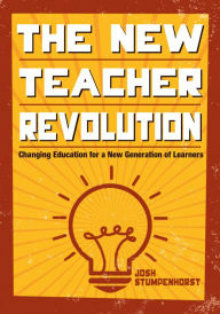Education for a New Generation of Learners
The New Teacher Revolution: Changing Education for a New Generation of Learners
By Josh Stumpenhorst
(Corwin, 2015 – Learn more)

I have one complaint about this book – its title. The word “new” in the title may be confusing enough to discourage veteran teachers from reading it, even assuming the publisher and author intend it to mean “a new revolution in teaching” and not “a revolution for new teachers.” Although Josh Stumpenhorst, known on twitter as @stumpteacher, does include new teachers in his audience, this book is an excellent read for all teachers who want to improve their practice and have an impact on changing education for the better.

Taking it to the classroom
Clear discussion, ideas, resources, and reflection questions are provided on a number of topics in education that individual teachers can impact. These include chapters on Progressive Classroom Management; Rethinking Motivation (including ideas on innovation days/passion time/genius hour); The Family Dynamic (how to change how we interact with parents/families); Technology as a Linchpin to Change (using tech to help students be engaged and create and have an authentic audience); Distractions Ahead (not to get pulled into the new, shiny trends); Education Traditions (and how to change them, including grading and homework), and Evolving Practice (how we can become the agents of change).
The revolutionary educator
Each chapter provides an easy to follow description of the current state of education, how that is not working, and specifics on things that teachers can do to change this in their own classroom. These changes will lead in turn “to a conversation” with other teachers who want to know about what the new things they are doing, and this in turn will ignite a grassroots revolution in education.
Stumpenhorst emphasizes that for these changes to take place and to improve education for the next generation of learners, teachers need to be reflective, open-minded to other approaches, and receptive and responsive to criticism. In his chapter on Evolving Practice, Stumpenhorst gives us clear suggestions on how to be this type of educator, to improve our own teaching and, as agents of change, to “start the conversation” with other educators, including being connected to other like-minded educators outside of our schools and districts.
The New Teacher Revolution is full of great ideas and resources to be connected and to continue improving your teaching. I would definitely recommend this book to all teachers, not just new ones.
Dr. Laura Von Staden is a Special Education Middle School Teacher in Tampa, Florida. She serves on numerous committees both at her school and within her district and works closely with the local university where she is a Professional Practice Partner and a master mentor. Dr. Von Staden also facilitates both online and face-to-face Professional Development for her school district.






























Thanks for the review. I’m always looking for new books with ideas for improving both my own, and my students’ performance.
The idea of breaking away from the “Industrial Revolution model” is a recurring theme that has been around for years. Teachers should certainly strive to innovate and improve their classrooms, but I think they run into a couple of major roadblocks. One is administrations and school boards that get mired in bureaucracy, and the other is the stranglehold that standardized testing has placed on classroom teachers. As much as most teachers would like to change and improve, meeting those dreaded standards and hitting all eligible content often remains their primary focus because they fear for their jobs.
If change is going to happen, I think it would occur much more quickly with the blessings and encouragement of administrators who openly embrace new methods of teaching. Then, teachers could move forward without fearing that their new approaches are going to be blamed if students don’t perform well on state tests. Just my thoughts.